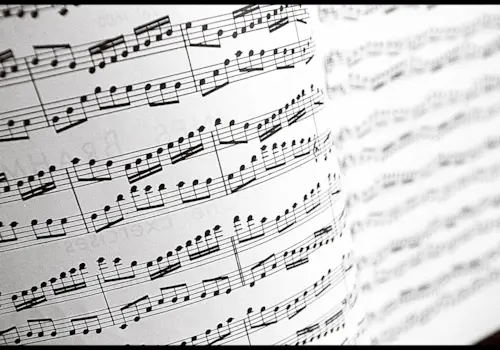22 September 2011
|
At only 23, the German-Japanese pianist Alice Sara Ott has already recorded Liszt’s <em>Transcendental Etudes</em> and has stepped in for the likes of Lang Lang at the last minute. She talks to an impressed Jessica Duchen ...
Arriving at Alice Sara Ott’s hotel, I spell her surname for the receptionist. ‘That’s O-T-T... ’ At first there doesn’t seem to be much that’s explicitly ‘Over The Top’ about this brilliant young pianist. Turning 23 this year, Ott is a slender young woman with long hair and an air of remarkable serenity. Still, to be able to step in for Lang Lang at short notice has to involve a certain willingness to risk everything and more. And beneath that calm exterior is one of the most determined young pianists you could hope to encounter.
‘I’m very stubborn,’ says Ott. ‘I’m a Leo, born in the Year of the Dragon, and I think that describes my personality.’ Lions and dragons: she’s laughing, but there’s an undertone that shows she means business. ‘I know myself very well,’ she adds. ‘I am somebody who takes risks – because I don’t want to die one day and ask myself then what might have been if...’
She certainly meant business when she was drafted in to replace Lang Lang as soloist in Liszt’s Piano Concerto No 1 with the London Symphony Orchestra and conductor Daniel Harding. The event, last November, started modestly enough. ‘I had a couple of days off; I was near Hamburg with my boyfriend and I thought I could just relax,’ Ott says. Then the phone rang. ‘I took a cab to the airport to catch the last flight to London. We had the general rehearsal in the morning and the concert in the evening. So it was really short notice! But luckily I’d just played the piece and I knew Daniel Harding already because I’d stepped in for Hélène Grimaud on a tour with him when she became ill. It was my first concert with the LSO, so it was a big honour, but people were so nice and so warm that it was wonderful. For a young artist it’s one of the best opportunities!’
The critical response was ecstatic: ‘There’s beauty, and mischief too, in her playing, which rings out with a freedom, fluidity and lack of contrivance which is entirely refreshing,’ said theTimes critic, while the Guardian declared that she had given ‘the kind of gawp-inducing bravura performance of which legends are made.’
Ott seems to have had a sense of destiny from the start. She was born in Munich to a German father and Japanese mother: ‘My mother studied piano, but my father has nothing to do with music. My sister is a pianist as well.’ Even her earliest memories are bound up with the piano. ‘I was taken to a concert when I was three years old and I remember that I was feeling a bit frustrated because I couldn’t really express myself in words – that’s a problem every small child has. I constantly felt that people didn’t understand me. In that situation a child instinctively looks for something else. I remember sitting in the concert listening to the music: it had such power that it went beyond words. I thought then that if I could master this language, then people would listen to me and understand me.’
Though little more than a toddler, the small Alice promptly told her mother she wanted to become a pianist. ‘She said: “No way!” I tried for a year to convince her to let me learn the piano. Eventually she gave in, so at the age of four I started having my first lessons.’ Her first teacher did not load her with technical exercises, she says, but plunged her straight into real music. ‘Bach inventions were fascinating for me because there are so many voices: to put them together was like a big jigsaw puzzle game. At the piano I never got tired; it just seemed natural.’
Aged five, she played in a competition for young (very young) musicians in Munich, for which the final stage was held at the city’s famous Herkulessaal. ‘I don’t think I was aware that it was a competition,’ Ott says, ‘but I remember that when I was playing I could feel everyone was listening to me and when I stood up and bowed to the audience everyone was clapping and shouting “Bravo!” At that moment I felt that people finally understood me and I decided that that would be my future. There was never anything else.’ [Continued...]
To read this article in full, order your copy of issue No 62 today
‘I’m very stubborn,’ says Ott. ‘I’m a Leo, born in the Year of the Dragon, and I think that describes my personality.’ Lions and dragons: she’s laughing, but there’s an undertone that shows she means business. ‘I know myself very well,’ she adds. ‘I am somebody who takes risks – because I don’t want to die one day and ask myself then what might have been if...’
She certainly meant business when she was drafted in to replace Lang Lang as soloist in Liszt’s Piano Concerto No 1 with the London Symphony Orchestra and conductor Daniel Harding. The event, last November, started modestly enough. ‘I had a couple of days off; I was near Hamburg with my boyfriend and I thought I could just relax,’ Ott says. Then the phone rang. ‘I took a cab to the airport to catch the last flight to London. We had the general rehearsal in the morning and the concert in the evening. So it was really short notice! But luckily I’d just played the piece and I knew Daniel Harding already because I’d stepped in for Hélène Grimaud on a tour with him when she became ill. It was my first concert with the LSO, so it was a big honour, but people were so nice and so warm that it was wonderful. For a young artist it’s one of the best opportunities!’
The critical response was ecstatic: ‘There’s beauty, and mischief too, in her playing, which rings out with a freedom, fluidity and lack of contrivance which is entirely refreshing,’ said theTimes critic, while the Guardian declared that she had given ‘the kind of gawp-inducing bravura performance of which legends are made.’
Ott seems to have had a sense of destiny from the start. She was born in Munich to a German father and Japanese mother: ‘My mother studied piano, but my father has nothing to do with music. My sister is a pianist as well.’ Even her earliest memories are bound up with the piano. ‘I was taken to a concert when I was three years old and I remember that I was feeling a bit frustrated because I couldn’t really express myself in words – that’s a problem every small child has. I constantly felt that people didn’t understand me. In that situation a child instinctively looks for something else. I remember sitting in the concert listening to the music: it had such power that it went beyond words. I thought then that if I could master this language, then people would listen to me and understand me.’
Though little more than a toddler, the small Alice promptly told her mother she wanted to become a pianist. ‘She said: “No way!” I tried for a year to convince her to let me learn the piano. Eventually she gave in, so at the age of four I started having my first lessons.’ Her first teacher did not load her with technical exercises, she says, but plunged her straight into real music. ‘Bach inventions were fascinating for me because there are so many voices: to put them together was like a big jigsaw puzzle game. At the piano I never got tired; it just seemed natural.’
Aged five, she played in a competition for young (very young) musicians in Munich, for which the final stage was held at the city’s famous Herkulessaal. ‘I don’t think I was aware that it was a competition,’ Ott says, ‘but I remember that when I was playing I could feel everyone was listening to me and when I stood up and bowed to the audience everyone was clapping and shouting “Bravo!” At that moment I felt that people finally understood me and I decided that that would be my future. There was never anything else.’ [Continued...]
To read this article in full, order your copy of issue No 62 today
Content continues after advertisements







